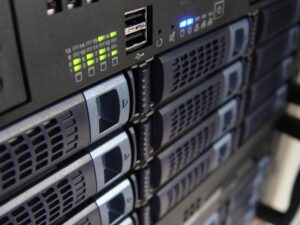 The pace of technological change has left an indelible mark upon the business landscape, increasing forever the speed and efficiency with which business is done. But as computers have brought unprecedented levels of productivity to many sectors of the economy, some business managers still see IT as a regrettable expense, rather than a strategic investment in efficacy and growth. A small business owner considering taking IT infrastructure to the next level can be forgiven for experiencing some sticker shock—but if your business is growing from a few computers to half a dozen or more, it’s probably time to think about a server. What can a server do for your office?
The pace of technological change has left an indelible mark upon the business landscape, increasing forever the speed and efficiency with which business is done. But as computers have brought unprecedented levels of productivity to many sectors of the economy, some business managers still see IT as a regrettable expense, rather than a strategic investment in efficacy and growth. A small business owner considering taking IT infrastructure to the next level can be forgiven for experiencing some sticker shock—but if your business is growing from a few computers to half a dozen or more, it’s probably time to think about a server. What can a server do for your office?
Centralized Data Storage
When a company’s operations are all being handled by a single computer, it’s fairly easy to keep data straight. When specialization occurs, however and teams using different computers need to access the same data, collaborate and share information, a server can be the ideal solution. With a server, all company files can be stored in a single, central location, where everyone who needs them can have access to them. This centralized storage also makes backups much easier to do and much less expensive—instead of paying for a cloud backup solution for each individual computer or using a separate external hard drive for each machine, the server does a regular automated backup of everything.
Dedicated Device
When using a server, if a computer crashes or is having hardware problems, users can simply switch to any other computer in the office, log in with their user name and have access to all their files and configurations. This can keep internal operations running smoothly and ensure continuity. Servers are designed to stay up and running 24/7, 365 days a year, even when some of the computers connected to it are down.
Access Control
Just as you might not want everyone who works for you to have access to all the physical papers in your office, you might not want every employee to be able to access all the data on your network. With a server setup, it is easy and efficient to designate which employees have access to what. A network administrator can, for example, ensure that an employee can access the accounting files they need to do their job, but that they do not have permission to access other workers’ HR files.
Efficient Administration
The server domain environment allows administrators to set blanket policies for all the computers in an office. This ensures that all your employees have up to date software, the latest security software and definitions, along with installing software patches, printers or other devices. For an office with more than a handful of computers, this can be a tremendous time saver and also ensure that nothing gets missed or forgotten about on certain devices.
Remote Access
Modern servers have remote access capabilities built in, to allow staff and leadership to access their files and the resources of the office from anywhere. For industries where employees are frequently traveling, working disparate hours, or telecommuting from home, this can be a real source of increased efficiency, especially in the era of COVID.
The bottom line is that server solutions can make a world of difference for offices that rely on more than one or two computers. If your office is growing, or if you have been patching together your operations with 5 or more un-networked computers, it would be a good idea to explore whether investing in a server would make sense for your business. Call Mankato Computer Technology today to schedule a network assessment for your office.